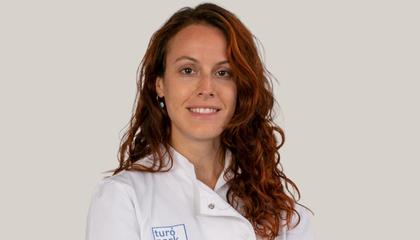Are you looking for a gynecologist to monitor your pregnancy?
The good news has been confirmed: you are pregnant! If all the feelings are mixed up, it is essential to think about you and your baby when planning your medical follow-up.
The gynecologists at our clinic in Barcelona support you throughout your maternity with personalised pregnancy monitoring.
This support aims to check the proper progress of gestation and prevent the possible risks generated by this period.
Fast track your treatment
To book an appointment or speak with one of our friendly team, please get in touch using the options below

What are the benefits of monitoring pregnancy?
Pregnancy should be experienced as a magical time. This is why a quality medical check is essential in order to face this period in the best conditions.
Prenatal consultations
These medical interviews are compulsory for all pregnant women. They are essential to control the progress of your pregnancy. The first visit takes place before the 3rd month. The other six, take place between the 4th and the 9th month of gestation.
These medical consultations are organized around the following points:
- Establish a general health check of the patient: during the first prenatal appointment, the mother-to-be discusses her family, medical and surgical history; her professional, and lifestyle habits; her previous pregnancies
- Check the constants: weight, pulse, blood pressure
- Fetal heart auscultations
- Uterine measurements
- Gynecological examinations
Exams and tests
During the three trimesters, the mother-to-be undergoes a whole series of tests and analyzes:
- Urin analyzes to check possible infections, and to control the presence of sugar and protein
- Blood tests: these are to detect problems of anemia or Rhesus incompatibility; detect pathologies (toxoplasmosis, rubella, sexually transmitted diseases, etc.)
- Trisomy 21 screening
- Amniocentesis: this is a sample of amniotic fluid, revealing detailed information about the fetus
Ultrasounds
These are certainly the most emotional times in the pregnancy follow-up. However, the three mandatory ultrasounds are considered primarily medical examinations.
- The first ultrasound: dates the pregnancy and aims to examine the organs and limbs of the fetus. The examination gives rise to two important measurements: the cranio caudal length (distance between the top of the head and the bottom of the buttocks) and the nuchal translucency (thickness of the fetal neck). The healthcare professional checks the ovaries and uterus to detect possible malformations.
- The second ultrasound: it takes place between 22 and 24 weeks of amenorrhea. It allows you to reveal the sex of your future child and to check the progress of its growth (measurements of the brain, bones, nose, etc.).
- The third ultrasound: performed around the 8th month, it is defined as the well-being of the fetus. All the organs have been scrutinized. In addition, healthcare professionals pay special attention to the beating of the heart and the location of the placenta.
Which are the first signs of childbirth?
Since the first prenatal visit, you have the approximate due date in mind. However, your child may decide to show the tip of his nose earlier or later than expected.
This is why our team of gynecologists at Turó Park Clinics ask you to be vigilant if you are facing the following signs.
- Closer contractions: The contractions at the beginning of labour are regular, more intense and much closer together than those you have experienced in the last three trimesters.
- Water breaking: As you approach term, the baby moves further and further down into your pelvis, pressing on the membranes around the uterus. This causes the water to break, releasing amniotic fluid. Once this part is ruptured, the baby loses its shell, preventing infections.
- Thicker vaginal discharge: Within a few weeks of your baby's arrival, you may experience a more intense vaginal discharge than during the first months of pregnancy. This sign does not indicate, in any case, an imminent childbirth.
- The loss of the mucous plug: the expulsion of this small mass of mucus can occur up to ten days before childbirth. Ejected due to movement of the uterus (dilation, contractions), this plug is used to close the cervix.
We care for Women.
Our specialists offer obstetrics and gynecologic care for women through all phases of life, from your pre-teen years to post-menopausal years.

Our English-speaking gynaecologists


